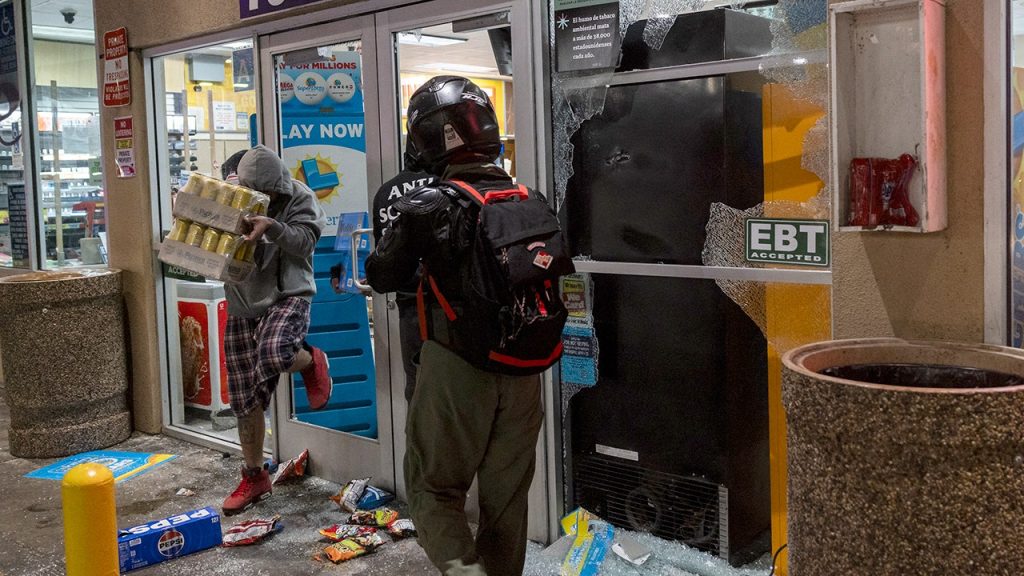In a recent surge of criminal activity, looters in California are experiencing significant repercussions as law enforcement agencies ramp up their response. The emergence of aggressive policing, especially in urban areas, aims to deter thefts and uphold public safety. This article explores the ongoing looting incidents, the law enforcement’s initiatives, and the broader implications for community safety.
| Article Subheadings |
|---|
| 1) Rise in Looting Incidents Across California |
| 2) Law Enforcement’s Response and Strategies |
| 3) Community Reactions to Increased Police Presence |
| 4) Legal Implications for Individuals Involved |
| 5) Future Outlook on Crime and Policing in California |
Rise in Looting Incidents Across California
Over recent months, California has witnessed a troubling increase in looting incidents primarily concentrated in urban areas. Authorities report that neighborhoods in Los Angeles and San Francisco have experienced spikes in thefts, particularly at retail establishments. The looters often take advantage of various factors, including societal unrest and a perceived lack of immediate repercussions.
According to local officials, the time frame for these incidents significantly correlates with large-scale events or public gatherings, putting communities on high alert. The economic impact of these looting waves has not only adversely affected businesses but also has instilled fear among residents, leading to heightened tension in affected neighborhoods.
Law Enforcement’s Response and Strategies
In response to the increasing frequency of looting, law enforcement agencies across California are adopting more aggressive policing strategies. Officials have confirmed deployment strategies focusing on high-crime areas, with additional patrols and surveillance. The intent behind these aggressive measures is to create a visible deterrent against potential criminal activities.
Moreover, leadership from various law enforcement bodies has pressed for increased collaboration with community organizations. Strategies have included using technology, such as facial recognition software and enhanced police presence during vulnerable times, which is anticipated to restore a sense of safety among residents and deter potential looters.
Community Reactions to Increased Police Presence
Community responses to heightened police activity have been mixed. Some residents feel reassured by the stronger presence, viewing it as a necessary measure to combat the crime wave. Others, however, express concerns over potential over-policing, fearing that it may escalate tensions or further alienate vulnerable communities.
Public forums have seen heated discussions where residents voice their opinions on how to strike a balance between enforcing law and maintaining civil rights. Advocacy groups argue that maintaining community trust is essential, urging law enforcement to adopt more community-based approaches in addition to stronger policing methods.
Legal Implications for Individuals Involved
The legal consequences for individuals involved in looting can be severe. Prosecutors have stated they will pursue felony charges for those caught stealing, aiming to send a clear message that such actions will not be tolerated. These charges can lead to substantial prison time and significant fines, depending on the circumstances surrounding the theft.
Recent cases highlight the rigorous application of laws against looting, pushing for harsher penalties for repeat offenders. Legal experts indicate that this might result in a lingering effect on individuals’ criminal records, disproportionately impacting lower-income individuals who might lack access to legal representation.
Future Outlook on Crime and Policing in California
Looking forward, experts predict an ongoing struggle between community safety and civil rights in California. Policymakers are expected to continue debating effective strategies to address rising crime while ensuring the fair treatment of all individuals. The dialogue regarding appropriate law enforcement measures will likely intensify, influenced by public sentiment and ongoing societal developments.
As crime rates fluctuate, law enforcement agencies may need to reassess their approaches continuously, employing innovative solutions to address community concerns while ensuring safety. The balance between deterrence and community trust remains at the forefront of discussions about California’s future crime and policing landscape.
| No. | Key Points |
|---|---|
| 1 | California is experiencing a significant rise in looting incidents, particularly in urban areas. |
| 2 | Law enforcement responses include increased patrols and surveillance to deter criminal activity. |
| 3 | Community reactions to heightened police presence are mixed, with some feeling reassured and others concerned about over-policing. |
| 4 | Individuals involved in looting may face severe legal consequences, including felony charges and prison time. |
| 5 | Future discussions on crime and policing in California will focus on balancing community safety and civil rights. |
Summary
As California battles increasing looting incidents, the response from law enforcement highlights an urgent need for effective crime deterrents while navigating community concerns. The ongoing situation calls for awareness of legal implications for offenders and the necessity for continued dialogue between police and residents. Ultimately, finding equilibrium between safety and civil rights is essential as the state moves toward addressing crime proactively.
Frequently Asked Questions
Question: What are the main causes of the increase in looting incidents in California?
The rise in looting can often be attributed to various factors, including societal unrest, economic hardships, and perceived lapses in law enforcement response, which embolden potential offenders.
Question: How are law enforcement agencies addressing the spike in looting?
Law enforcement agencies are increasing patrols, employing surveillance technologies, and collaborating with community organizations to deter looting and restore public safety.
Question: What are the potential legal consequences for looters?
Individuals caught looting may face felony charges, which can result in significant fines and prison time, affecting their criminal records and future employment prospects.
